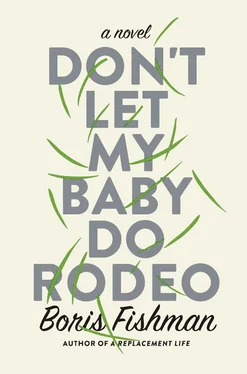Even though the hallway is lit up, the kitchen is dark, and from its doorway Alex can make out only the silhouette of the girl at the sink, her ear jamming the crescent of a telephone. She wears black gym shorts and a man’s A-shirt, Alex jealously wondering is it Dima’s, and only one of her feet is solid with the floor, the other inclined as if she is about to lean for something. Znayu, znayu , she says to the other end of the line, stifling irritation—“I know, I know”—as the pot in her hands bangs the walls of the sink. The kitchen has been ravaged: Every inch, including the floor, is taken up with used pots, used cooking utensils, used cutlery. As Maya talks, a cigarette finishes smoking itself in a tin plate on the windowsill. The window is cracked open, and the cold air eats a little ash off the cigarette with each gust, scattering it on the linoleum. Alex wants to walk over and ash the cigarette.
On entering the kitchen, Dima heads for the fridge without even greeting Maya. Alex’s heart swells at this encouragement: There is distance between them. But then Maya, also not turning to face them, in fact initiating a new round of assurances of the person on the phone, snaps her fingers by the back of her thigh, where Alex is only happy to look. There, on the edge of the kitchen table, between an enamel bowl and a cutting board heaped with what looks like cured pork, he sees two sandwiches and a thermos. Despite her chaos, Maya has made them food and something warm for after the game. Alex’s heart falls. She and Dima do not even need to say hello, they are so close with each other.
But Alex also feels an agreeable warmth: Twenty minutes before, when he was hurtling uptown in a subway car, when Dima’s girlfriend Maya was as meaningful to him as a deli cashier, her mind was on him as she fixed him a sandwich. No, not him — some friend of Dima’s named Alex — but that was him too, wasn’t it?
Dima knocks over his daydream: He walks to Maya, palms the sandwiches, leans down to kiss the back of Maya’s thigh , and, still not having exchanged a direct gaze with his girlfriend, brushes past Alex on his way out of the kitchen.
Alex’s discouragement is so absolute that he is surprised even more than Dima when he says, to Dima’s back, “We should stay.” In the hallway, Dima hoists his hockey bag back onto his shoulder and gives his friend a confounded look. Alex repeats, his heart pounding: “She needs help.” Dima regards Alex impatiently. “Let’s go ,” he says. “We’ll be late.” “ Dima ,” Alex savors his objection. “She needs help.”
Maya has clicked off her call, and listens to their conversation with amusement, a little insolent like Dima’s. “So help,” he hears Dima say in exasperation. “I have a hockey game.” And with that Dima waddles through the door, the hockey bag banging the doorjamb, and Alex and Maya are left alone.
Alex’s mind rushes to take hold of the events just elapsed because he has been no less of a bystander to them than Maya. In better light, she is pretty, but not so pretty that Alex must hide his crooked tooth while speaking. Her face is young, too young for twenty-two, two little coals blinking out of it with mockery and surprise, two brows that would make an Armenian girl proud, one pigtail. Typically, the Russian girls to whom Alex is introduced by his mother cause a mixture of itchiness and despair, so why this behavior now? For Maya is one of them — the enamel cooking bowls, the row of house slippers by the front door, the grandparent photos on the living room mantel all prove it. But the Russian girls Alex has met have been brought to him by his mother like a bird dog trudging back with prey in its mouth. This girl Alex has found on his own. But he didn’t find Maya on his own. She’s Dima’s girlfriend. He remembers Dima — when he walked out the door, he walked out of Alex’s mind — and a sweat starts at his hairline.
Maya breaks through the glazed silence. “They say the mark of a professional chef is not the food that he makes, but how many dirty dishes he leaves,” she says. She flicks an empty measuring cup off a chair, flour scattering from its edges; plops down so that Alex sees her thighs flutter in answer, a long blue vein running down one of them; plucks the cigarette from its tin nest on the windowsill, and draws hungrily only to find it long dead. She waves it at him and nods cynically: See? Even the cigarette’s dead.
“Well, you’re not a professional chef,” he says, meaning to soothe.
“Oh, no?” Maya says, stretching out her legs and wriggling her toes. He marvels at her lack of self-consciousness in front of a new person. “That was the idea.”
Alex stares, puzzled. “You’re in college,” he offers hesitantly as evidence.
She confirms this with a dark dip of her head. The pigtail slides over her shoulder. “I’m in college,” she affirms. “But I don’t want to be a doctor in Kiev. I want to be a cook in New York.”
Alex isn’t sure what to say. Short, stubby, smiling Mexicans cook; the Hispanics with whom he and Dima play hockey cook; not underweight girls. He imagines telling his parents that he is dating a girl who cooks on a line, sweat on her neck and grease on her forearms.
“A cook of what?” he inquires. “Ukrainian food?” he jokes.
“Why not?” she says, and Alex gets his first glimpse of Maya sans playfulness. “To us it’s familiar, but the Americans don’t know it. There are two Ukrainian restaurants in Manhattan, both like you’re eating boiled shoe lost in corn oil. Imagine a place with a cool feeling, like a lounge instead of your grandmother’s house, cool art, like maybe Gogol’s face in neon. Café Gogol.” She lets this sink in, then adds: “Maya Shulman, chef.” She is so taken by the fantasy that the distress temporarily vanishes from her face and she snatches up the used cigarette and tries to smoke it once more. Once more apprised of its uselessness, she flings it into the sink with a bruised irritation that makes Alex want to touch her shoulder. Suddenly, Maya throws herself to the linoleum and starts sweeping up ash and flour with the side of her palm. Somewhere beyond the front door, Alex hears the parrot again.
“So you’re not going back when the school year is over?” Alex says hopefully.
“I can stay for one extra year,” she says from the floor, “but only in my major. In a medical job.”
Alex can’t quite make sense of the information. Café Gogol? Setting aside the visa issue, where does she plan to get the money for something like that? A café, like a seedy boulevardier in a second-rate town in southern Russia, whiling away the day between too many coffees and too many cigarettes at a front table done up in fake marble in pathetic imitation of a Parisian café? Actually, for a man, the role is more or less imaginable, but for a woman? Alex smiles at Maya in embarrassment, hiding his thoughts. He feels relief, too: This silliness makes her less daunting. Then Alex chides himself: She is new to the country, how can she know? Wanting to be kind, he changes the subject.
“So you keep cooking, and I’ll clean,” he says. “What’s the occasion, anyway?”
“Are you hungry?” she says.
“It’s true, he left with both sandwiches.”
“Let me show you the apartment. I can’t show you the other girls’ bedrooms, but the living room has nice windows.”
The obligatory walk through the premises: a Soviet habit. Following Maya out of the kitchen, Alex for some reason imagines himself in his mother’s home when she was twenty-three, just a year before Eugene Rubin walked into her life. A shamefully obvious notion follows: Once, my mother was my age. Alex tries to picture Raisa as a young woman but can’t, even though he has been shown many pictures in many albums; Raisa’s present rolls and tiers insist on the view. Attempting to do the same with his father, all Alex can conjure up is Eugene at his present age, fifty, crouching; that is the way Alex manages to translate him to a younger size.
Читать дальше












